|
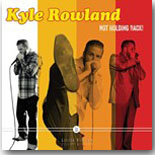 Kyle
Rowland got his start in music at the age of
10. In 2024, he became the youngest member to be
inducted into the Sacramento Blues Hall of Fame
and he's advanced to the semi-finals in the
International Blues Challenge in 2024 and 2025. Kyle
Rowland got his start in music at the age of
10. In 2024, he became the youngest member to be
inducted into the Sacramento Blues Hall of Fame
and he's advanced to the semi-finals in the
International Blues Challenge in 2024 and 2025.
He's developed
his own sound on harmonica with assistance from
some of his heroes, most notably James Cotton,
Lazy Lester, Charlie Musselwhite, and Billy Boy
Arnold. He also counts Hubert Sumlin, Matt
“Guitar” Murphy, and Henry Gray as influences.
With his band, Rowland & Tumblin', he's played
numerous blues festivals and clubs.
Rowland's latest
release, Not Holding Back (Little Village
Foundation), demonstrates his versatility, as he
ably handles traditional, contemporary, and
country blues, soul, funk, and a bit of pop.
Rick Estrin and Kid Andersen produced the album
(Andersen also plays guitar, B3, and bass on
selected tracks) and a host of musicians
contributed, including guitarists Johnny Burgin,
Bob Welsh, Anson Funderburgh, Justin MacCarthy,
Steve Gurr, and Kenny Marchese, keyboardist Jim
Pugh and Welsh, bassists Ronnie James Weber and
Randy Bermudes, drummers Paul Revelli, June
Core, Myles Silveira, percussionist Coastin'
Hank, and backing vocalists Dennis Dove, Lisa
Andersen, and Marcel Smith.
The mid-tempo
urban blues “Convict No. 1” opens the disc, with
Rowland declaring himself a prisoner of his
baby's love, backed by Burgin's guitar. Rowland
wrote this tune and the next one, “Wishing You
The Best,” a wonderful Memphis-based soul track
with an emotional vocal and a nice harmonica
break.
“I'll Take You
Back,” co-written by Estrin with Donnie
Woodruff, is a rock-solid West Side blues tune
down to the Magic Sam riff that drives the song,
and the upbeat “We're Still Friends,” written by
Mighty Mike Schermer and Felice Garcia, is an
old school ballad.
“Kissing at
Midnight,” written by Billy Boy Arnold and Syl
Johnson, is a nice, easygoing vehicle for
Rowland, both vocally and on harmonica. Fillmore
Slim's “You Got The Nerve Of A Brass Monkey” is
a raucous rock n' roller with a torrid solo from
Funderburgh and a ripping piano solo from
Rowland, who plays guitar and harmonica on the
gritty original “Gamblin' Blues.”
Rowland also
penned “E.G.O.,” which has a classic soul feel
right out of Memphis, with smooth backing
vocals, Burgin's guitar, and Andersen's B3. St.
Louis Jimmy Oden wrote “Complete This Order,”
with Rowland delivering a fiery harmonica solo
in between the unusual items requested from
Rowland to his lady. “Coffee Man” is a gentle,
lilting blues in the tradition of Mississippi
John Hurt as Rowland accompanies himself on
guitar and harp, with bass from Andersen.
“Stockton
Boulevard” is a cool and funky instrumental with
Rowland on harp, MacCarthy on guitar, Andersen
on B3, and Silveira on drums. “Backtracking” is
a classic blues tune written by Junior Parker,
and Rowland pours his heart out vocally, backed
by Burgin's stinging guitar work, also adding a
tough harmonica solo.
Rowland wrote the
next two tracks; the funky blues “Must've Been A
Dream” and “The County Pen,” a country-flavored
blues about meeting a feathered friend in
prison.
“This Train” is an old tune that Alan Lomax put
to paper in the early 1920s, and Rowland closes
the disc with a stirring, swinging version of
the spiritual with guitar assistance from
MacCarthy and Andersen.
Not Holding
Back collects everything that's great about
the blues in one package. Kyle Rowland is a
master craftsman, both instrumentally and
vocally. This album is a thrill to listen to
from start to finish.
--- Graham Clarke
 When
I first heard the 11 songs on the new album,
Be About It! (Far-Tone Records) by harmonica
ace Ryan Hartt, I assumed he was from the
West Coast since his sound fit with the many
other solid players and singers from the region.
Instead, this cat is from Connecticut and has
been around the New England blues scene for
nearly 30 years. When
I first heard the 11 songs on the new album,
Be About It! (Far-Tone Records) by harmonica
ace Ryan Hartt, I assumed he was from the
West Coast since his sound fit with the many
other solid players and singers from the region.
Instead, this cat is from Connecticut and has
been around the New England blues scene for
nearly 30 years.
Hartt packed the
studio with some notable players for the
session. Contributing to the big sound on Be
About It! are Nick Toscano (drums), Jeff
Berg (guitar/bass), Mike Law (bass), Brooks
Milgate (piano), Nick Adams (guitar), Tom
Ferraro (guitar), and Jad Tarig (guitar).
All 11 cuts on
the album are strong blues tunes, starting with
the mid-tempo blues "Breakin' Even," as Hartt
tells about how he just can't get ahead with his
finances. He then provides a very nice harp
intro to the sorrowful but fun blues, "Queen of
Everything," as he provides details about his
relationship in which she's the queen of
everything and he's the king of what's left
over.
Jad Tariq is a
Memphis guitarist who had his own thing released
earlier this year and is a name to file away for
future reference. He shares solos with Hartt on
the up-tempo stomper "Old Habits Die Hard," and
then again on the mostly instrumental jump
blues, "All Night Long," with the only vocals
being a chorus shouting out the song title after
the guitar and harmonica riffs.
Slowing the tempo
considerably is the pleasant, lilting love song,
"Nothing Sweet As You," with Hartt complementing
his tender vocals with the occasional harmonica
break. Adams provides the guitar wizardry on the
mid-tempo blues shuffle "I Wonder Why," with
Hartt also coming in with sharp-sounding
harmonica solos.
A rather unique
sound comes from the instrumental "Hawaiian War
Chant," with just rhythmic tribal drumming and
harmonica throughout. It's a very cool tune, one
of my favorites. Returning to a more traditional
blues is the up-tempo shuffle, "That's Right,
You're Wrong," with Adams putting out a very
fine guitar solo while Hartt sings about sending
that woman back to her other guy.
Another mood
changer is the slow, late night blues, "Lonely
Hour," an eight-minute song that entrances
throughout, thanks to Hartt's tasteful harmonica
work and entrancing piano solos from Milgate.
The tempo goes to the other extreme on the
jumpin' blues "I Can't Stop Loving You," with
plenty of incendiary harp from Hartt.
Wrapping up this
very tasty album is a slow instrumental, "You
Belong To Me," which we all remember the Jo
Stafford original from 1952. With Hartt's gentle
harmonica playing substituting for the customary
vocals, it's a nice, calming ending to an
extremely fine album.
Be About It!
should be on every blues fan's shopping list.
It's Hartt's first album in 13 years, so let's
hope he gives us a follow-up before too long.
Highly recommended.
--- Bill Mitchell
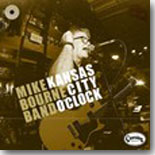 The
Mike Bourne Band pays tribute to the music
of Kansas City on his exciting new release,
Kansas City O'Clock (Overton Music). Bourne
has been singing and playing his brand of blues,
jump blues, and roots music since 1998, inspired
by Louis Jordan, T-Bone Walker, and others, and
has played with artists like Otis Rush, Sam Lay,
Barrelhouse Chuck, and many others. The
Mike Bourne Band pays tribute to the music
of Kansas City on his exciting new release,
Kansas City O'Clock (Overton Music). Bourne
has been singing and playing his brand of blues,
jump blues, and roots music since 1998, inspired
by Louis Jordan, T-Bone Walker, and others, and
has played with artists like Otis Rush, Sam Lay,
Barrelhouse Chuck, and many others.
For this latest
effort, Bourne is joined by over 20 musicians,
including Johnny Burgin, Dougan Smith, Steve
Dougherty, Patrick Recob, Jim Beisman, and many
others. The set features 14 tracks, 12 originals
and two covers.
Kicking off the
disc is “Can't Be Anybody But Myself,” a swinger
highlighted by Bourne's vocal and guitar, Dougan
Smith's sax, and Beisman's piano. The amusing
“Beer In The Morning” follows, a hard-rocking
blues with barrelhouse piano and Ryan Styles'
sax, and “Too Old To Be Young” starts slow, but
picks up the pace quickly into a swinging
shuffle that really cooks.
Beisman channels
Professor Longhair on the piano intro to
“Caffiene Blues,” adding a bit of Crescent City
spice to the proceedings. The title track pays
tribute to the music of the city as the band
really kicks into the groove with great solos
from sax, piano, guitar that will have toes
tapping and heads bobbing.
The instrumental
“Kick'n A Deuce” is a fine showcase for Bourne's
nimble fretwork, the lively “YOLO” revisits the
New Orleans vibe and offers good advice for
daily living. The band's clever, adult update of
the nursery rhyme “Three Blind Mice” is a lot of
fun.
“Really Nice
Girl” is a slow blues about a gal who's maybe
not what she appears to be, and a sparkling
cover of John Hahn's“Dive Bar Romance” is first
rate. The album's other cover follows, a
dazzling version of Jay McShann's “Fore Day
Rider,” with outstanding contributions on
trumpet (Austin Barry), sax (Smith), and piano (Beisman).
“Truth Dressed Up
Like A Lie” is a tough blues rocker driven by
Smtih's sax. “Rather Be Happy Than Normal” gets
downright funky, and the closer, “People Not
Politics,” finds Bourne stressing the importance
of people over politics, backed by a nice Burgin
guitar solo.
Kansas City
O'Clock is an exhilarating tribute to the
music of one of America's most vibrant sources
of music, courtesy of the Mike Bourne Band, one
of the best purveyors of the sound currently
practicing.
--- Graham Clarke
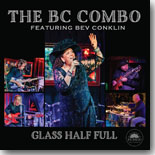 Singer
Bev Conklin was born in New Orleans, but has
spent over 30 years in Pennsylvania's Lehigh
Valley, where she has tirelessly working to
promote the blues via the Women's Blues
Alliance, the Lehigh River Blues Jam, and the
Roots Music Concerts series. Singer
Bev Conklin was born in New Orleans, but has
spent over 30 years in Pennsylvania's Lehigh
Valley, where she has tirelessly working to
promote the blues via the Women's Blues
Alliance, the Lehigh River Blues Jam, and the
Roots Music Concerts series.
She also fronts
The BC Combo (Wayne Smith –
vocals/guitar/keyboards, Joe Mac – guitar, Glenn
Spadone – drums, Mitch Shelly -bass). The band's
latest release, Glass Half Full (MoMojo
Records) was recorded live at the Godfrey
Daniels listening room in Bethlehem,
Pennsylvania last November. Smith produced the
album and wrote all 12 tracks.
The uptempo
blues, “That Would Be Us,” opens the set, with
Conklin's voice backed by Smith's and Mac's
guitar. “Hooked On A Long Chain” is a slower
paced blues where she really stretches out on
vocals. Both of these tracks have been issued as
singles.
The title track
has a cool R&B groove with nice fretwork from
both guitarists, and the smooth R&B vibe
continues on the soulful “A Little Too Blue,”
where Conklin encourages us to step out of our
shell and embrace happiness.
Smith takes lead
vocals on the briskly-paced blues rocker, “Mr.
Agent Man,” begging his promoter for more work.
Conklin returns for the emotional “Love &
Affection,” with superb backing from the
guitarists and the rhythm section.
The somber “No
Back Door” was written by Smith for his brother,
who was lost to suicide, and Conklin's mannered
vocal is a nice fit for the subject matter.
Smith pays tribute to two others who left way
too soon on “Janis & Jimi,” with an anguished
vocal and guitar.
“It's A Small
Club” is a funky R&B-based blues that lightens
the mood a bit, and “We're Gonna Get Some” keeps
the upbeat pace moving along as Smith doubles on
organ from this track.
“Go Happy Go
Lucky” is a light, happy song that probably made
the audience feel pretty good. Smith sings the
closer, “I'll Leave With A Song,” a mission
statement of sorts for the artist, who probably
left a lot on the stage that night, given the
recent events he'd endured.
All in all, a
very good release from Bev Conklin and The BC
Combo. Glass Half Full is loaded with
great songs and inspired performances.
--- Graham Clarke
 The
Lucky Losers' sixth release, Arrival
(MoMojo Records), finds the group, led by
vocalist Cathy Lemons and harp master/vocalist
Phil Berkowitz, teaming up once again with Kid
Andersen for a tough set of originals. In
addition to Lemons and Berkowitz, the band
consists of Chris Burns (keys), Simon Govan
Smith (guitar), Edgar San Gabriel (bass), and
Jon Otis (drums/percussion). There's also a bevy
of guest artists (Danny Caron – guitar, Endre
Tarczy – bass, Paul Revelli – drums, and Doug
James – tenor sax, Mike Rinta – trombone, John
Halbeib – trumpet) chipping in, plus Andersen,
who adds guitar, bass, and keys on selected
tracks. The
Lucky Losers' sixth release, Arrival
(MoMojo Records), finds the group, led by
vocalist Cathy Lemons and harp master/vocalist
Phil Berkowitz, teaming up once again with Kid
Andersen for a tough set of originals. In
addition to Lemons and Berkowitz, the band
consists of Chris Burns (keys), Simon Govan
Smith (guitar), Edgar San Gabriel (bass), and
Jon Otis (drums/percussion). There's also a bevy
of guest artists (Danny Caron – guitar, Endre
Tarczy – bass, Paul Revelli – drums, and Doug
James – tenor sax, Mike Rinta – trombone, John
Halbeib – trumpet) chipping in, plus Andersen,
who adds guitar, bass, and keys on selected
tracks.
“S-C-A-M” opens
the disc, a funky take with vocals from Lemons
on one of the plagues of modern technology for
nearly everyone who has a phone or a computer.
“Sunday Stroller” is a cool blues rocker with
Berkowitz on vocals and harp, backed by Caron
and Andersen on guitars and Burns on the keys,
and “Pull On The Rope” finds Lemons paying
tribute to Mavis Staples in a gospel-flavored
call for unity.
The duo team up
for the R&B romance tune “Play It From The
Heart,” as Lemons backs Berkowitz's vocal. “I
Believer Her (Because I Am Her”),” a gripping
statement on childhood sexual abuse, was written
by Lemons, who experienced it herself as a
youth. The lyrics and her vocal performance are
searing in their intensity.
Caron and
Berkowitz wrote “Sorry Brother,” which borrows
the funky New Orleans rhythms of Allen
Toussaint's “Hercules,” spotlighting Berkowitz's
vocals and harp. “My Father's Song” is a moving
ballad with a soulful vocal from Berkowitz.
Lemons' “Pig Iron
Tough” brings up the funk as she reflects on
what it takes to survive relentless touring. The
same thing that helped her survive 15 moves
during the first 17 years of her life. She also
penned “Don't Let It Slip Away,” four solid
minutes of the sweetest soul music this side of
Memphis, powered by one of her most captivating
vocals, Caron's fretwork, and the three-piece
horn section.
Berkowitz takes a
look at his early years with the blues/R&B
shuffle “Misfit Kids,” sharing vocals with
Lemons as the tune moves to the present. The
pair close the album with an amusing country
blues duet, “Ain't The Marrying Kind,” as the
duo rails against marriage to the point of
talking themselves into it at the conclusion of
the song.. It's a fun conclusion to this
excellent disc.
Hopefully, Cathy
Lemons and Phil Berkowitz can keep it together
long enough to entertain blues fans with even
more of their wonderful music. Arrival is
their best effort, their most personal and their
most entertaining, with stellar performances by
all involved.
--- Graham Clarke
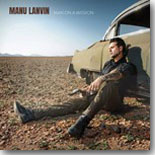 Manu
Lanvin has developed into one of France's
leading voices in the blues-rock genre. After
recording three rock albums, the
singer/songwriter/guitarist found his muse in
the blues and never looked back after co-writing
and producing troubled Texas roots and blues
artist Calvin Russell's last album, Dawg Eat
Dawg, in 2009. Manu
Lanvin has developed into one of France's
leading voices in the blues-rock genre. After
recording three rock albums, the
singer/songwriter/guitarist found his muse in
the blues and never looked back after co-writing
and producing troubled Texas roots and blues
artist Calvin Russell's last album, Dawg Eat
Dawg, in 2009.
His latest
release, Man On A Mission (Gel
Production), is a scrappy mix of blues, soul,
rock, and pop that was recorded in Paris,
Nashville, Montreal, Fort Lauderdale, and
Sheffield, but has roots deep in the heart of
Texas.
The opening cut,
“Just Need Me,” is a gritty, driving blues
rocker that showcases Lanvin's weathered vocals
and tough guitar work, while the catchy “I Can't
Get Enough Of You” adds a bit of soul and a
taste of pop to the mix.
The upbeat “Did
You See Judy?” is a frenzied search for a lost
lover, as indicated by Lanvin's desperate vocal.
Meanwhile, the soulful ballad “Change My Ways”
finds Lanvin regretting the loss of a lover
because of his unwillingness to change his bad
habits, and his vocals and fretwork are even
stronger on this track.
“I Got The Blues”
brings the blues to the 21st century, with
guitar, harmonica, and vinyl scratches as Lanvin
laments over a woman breaking his heart, his car
not running, Jehovah's Witnesses at his door,
and his wi-fi not working.
“Savigny-Sur-Orge” is a somber ballad, based on
personal memories, about tough times for Lanvin
and his mother as he grew up,. The energetic
“What's The Matter With U?” is a powerful track
that seamlessly combines rock, soul, and blues.
The amusing
mid-tempo rocker, “Saving Angel,” Lanvin advises
an interested party that he may not be the one
she's looking for. He shines vocally on “Don't
Wanna Say Goodbye,” a soulful pop-flavored
ballad with rocking guitar work, and “Could It
Be Love.” which has an intriguing rhythmic
pattern. “Make It Right” has a classic rock n'
roll rhythm with rollicking piano and backing
vocals (which are standout throughout the
album).
The album
concludes with the title track, a hypnotic blues
rocker with modern flourishes that serves as
Lanvin's musical statement as he roars through
the lyrics with determination. The final track,
“Une Nuit,” is a lilting melody with French
lyrics that wraps up the disc nicely.
Having never
heard Manu Lanvin before Man On A Mission,
I have to say that he possesses the total
package: excellent songwriting (he co-authored
12 of the 13 tracks), superb blues-influenced
vocals and guitar work, and the ability to leave
listeners humming his tunes or singing the
lyrics after they're done listening. Blues fans
should not miss this one.
--- Graham Clarke
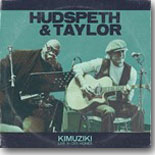 Hudspeth
& Taylor released one of my favorite albums
of 2023, Ridin' The Blinds, so I've been
looking forward to their next release, which has
now arrived in the form of a live album,
Kimuziki Live in Des Moines (Hudtone
Records). The set was recorded live in February
at the Central Iowa Blues Society's 30th annual
Winter Blues Festival. Brandon Hudspeth's crisp
guitar work serves as the perfect compliment to
Jaisson Taylor's robust vocals on nine tracks,
three written by Taylor, while the others are
superb interpretations of blues standards. Hudspeth
& Taylor released one of my favorite albums
of 2023, Ridin' The Blinds, so I've been
looking forward to their next release, which has
now arrived in the form of a live album,
Kimuziki Live in Des Moines (Hudtone
Records). The set was recorded live in February
at the Central Iowa Blues Society's 30th annual
Winter Blues Festival. Brandon Hudspeth's crisp
guitar work serves as the perfect compliment to
Jaisson Taylor's robust vocals on nine tracks,
three written by Taylor, while the others are
superb interpretations of blues standards.
Opening the set
is a rousing take of Jimmy Reed's “Going To New
York,” one of two Reed tunes represented, driven
by Hudspeth's guitar and Taylor's percussion.
Mance Lipscomb's “Run Sinner Run,” a standout
from Ridin' The Blinds, follows, with
marvelous interplay from the duo.
A tranquil
reading of Muddy Waters' “Honey Bee” slows the
pace a bit, with sound so clear that one
could hear a pin drop. Hudspeth's slide guitar
playing is superb on this track. The second Reed
track is a jaunty version of “Bright Lights, Big
City.”
The lilting
“Silly Billy,” written by Taylor for their debut
release, Folie a Deux, finds Hudspeth
channeling Django Reinhardt. The duo's cover of
Jimmy Rogers' “Walking By Myself” has a more
stripped-down feel than other tracks, with
Hudspeth's electric guitar work backed by
Taylor's percussion. You can't help but move
when listening.
The next two
tracks were written by Taylor for Folie a
Deux: the rhythmic “Daddy Baby” and the
ballad “I Think It's Going To Rain Again,” a
splendid slow burner with plenty of Hudspeth's
slide backing Taylor's soulful vocal.
Closing the set
is a tasty version of “Spoonful,” wrapping up
this outstanding performance about as well as
could be done.
Hudspeth & Taylor
have been working together for over two decades,
and it shows in every note played and every note
sung. Blues fans, both traditional and
contemporary, definitely need to grab or
download Kimuziki Live in Des Moines at
their earliest convenience. You'll be glad you
did.
--- Graham Clarke
 I've
been aware of the name Dave Keyes from
previous albums, but he remained more of
an obscure artist for me than a household name.
That's a mistake on my part, and it's been
rectified by his latest very fine album, Two
Trains (MoMojo Records). I've
been aware of the name Dave Keyes from
previous albums, but he remained more of
an obscure artist for me than a household name.
That's a mistake on my part, and it's been
rectified by his latest very fine album, Two
Trains (MoMojo Records).
The
appropriately named Keyes is a keyboard wizard,
capable on both piano and the B-3. He and his
songwriting partner, Mark Sameth, wrote eight of
the ten cuts on Two Trains, with one
instrumental credited just to Keyes and another
song being a Big Bill Broonzy cover.
Let's kick off this show. "Blues Ain't Lookin'
For You" is a mid-tempo blues shuffle, with
Keyes' piano playing being complemented by
persistent slide guitar from John Putnam and
harmonica by Rob Paparozzi. Up next is a
rollicking boogie woogie number, "Boogie Til The
Cows Come Home," confirming our thoughts that
the hands of Keyes can move rapidly around his
piano keyboard.
The
title cut, "Two Trains," is a real keeper, a
mid-tempo funky blues telling about a pair of
locomotives running on the same line as they
head for a nasty collision. Keyes switches to
the B-3 for "I'm Alright," giving this up-tempo
shuffle a gospel vibe, especially with Alexis P. Suter and Vicki Bell adding backing vocals from
the choir loft.
Keyes keeps it in the church with gospel piano
on the slow blues "A Long Way From Right Right
Now," with a mournful feel coming from
Paparozzi's subtle harmonica playing. Keyes
gives us rawer vocals on the very topical up-tempo
number "What Just Happened," an indictment of
our current environment of diminishing morals
and poor treatment of each other. Putnam lays
down a smokin' guitar break.
It's
back to boogie woogie on the instrumental
"Boogie For Patty," leading in to a mid-tempo
funky number, "Trust in Love and Fate." This one
features guest guitarist Chris Bergson, making
heavy use of a slide on his solos.
"Worried In Mind Blues" goes in a different
direction as more of an acoustic country blues,
with special guest Woody Mann sharing vocals and
nice guitar picking. It's just Keyes and Mann as
the back porch duo handles this very pleasant
number from Big Bill Broonzy. Closing the album
is "Rest In Peace," a slow, gentle tune with
just Keyes, his piano and a vocal mic, used as a
tribute to all of those who have gone on before
us.
Two Trains shows the versatility of Keyes as
a singer, keyboardist, band leader and
songwriter. It's a very fine album, and has me
digging back into his discography to see what
I've missed in the past.
--- Bill Mitchell
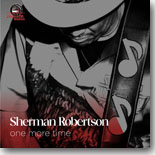 The
late Sherman Robertson was born in
Louisiana, but raised in nearby Houston, where
he was inspired to play guitar after seeing Hank
Williams on TV. He grew up near the famous
Duke/Peacock Records studios, where he met many
of the musicians who played on the recordings
produced there, and was soon playing with a
local band in the Fifth Ward neighborhood clubs. The
late Sherman Robertson was born in
Louisiana, but raised in nearby Houston, where
he was inspired to play guitar after seeing Hank
Williams on TV. He grew up near the famous
Duke/Peacock Records studios, where he met many
of the musicians who played on the recordings
produced there, and was soon playing with a
local band in the Fifth Ward neighborhood clubs.
Robertson was
heard by Clifton Chenier in 1982, and was soon
playing for the King of Zydeco. He appeared on
Paul Simon's classic album Graceland and
later hooked up with Terrance Simien after
Chenier's passing before forming his own band in
the early '90s.
Robertson
released two albums in the mid '90s for the
Atlantic Records subsidiary Code Blue,1994's
I'm The Man and 1996's Here And Now,
that mostly focused on contemporary blues and
soul. A release for Audioquest in 1998, Going
Back Home, mixed in some of the guitarist's
zydeco roots, followed by a subsequent live
release, 2006's Guitar Man Live on
Crosscut Records.
Robertson was not
really comfortable with the recording process,
which explains the gap in recordings, but during
a UK tour he was persuaded to go into the studio
with his UK touring band to work on what was to
be a new studio release. The band put together
four rough tracks with plans to return later in
the year to make revisions, but sadly, Robertson
suffered a stroke during the tour and never
recorded or performed again, passing away in
2022 at 72.
One More Time
(Redline Music) has been posthumously released
as a tribute to Robertson, the tracks left just
as they were. Robertson (lead vocals and
guitar), Gary Rackham (bass), Jools Grudgings
(keys), and Jamie Little (drums) are joined by
guitarist O. Pinnock on three tracks, Sam Rogers
on sax for two tracks, Bryan Corbett on trumpet
for two tracks, and Matt Hoy and Genevieve Sylva
provide backing vocals on three of the four
tracks.
“One More Time”
opens the EP, a nice slow blues, one of two
written by Marcus Malone, that spotlights
Robertson's soulful vocals and his incisive
fretwork. Robertson wrote the raw and funky
“Texas Cutie,” and provides enthusiastic vocals.
“What About Me”
is another deep soul ballad written by Malone,
and the last tune is a stirring version of Rufus
Thomas' “Memphis Train.”
Though the tracks
have a bit of an incomplete feel to them, they
work just fine because they capture Robertson's
energy and exuberance on vocals and guitar. It
really sounds like he'd gotten his recording
mojo back. I enjoyed Robertson's two Code Blue
recordings and these songs would have been a
fine fit on either album.
It's a shame
Robertson didn't get the opportunity to finish
this proposed album, but anyone who enjoyed his
work will be pleased with these tracks.
--- Graham Clarke
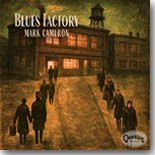 Minnesota-based
singer, songwriter, and guitarist Mark
Cameron has been making music for over 30
years, focusing on the blues for the past 15 or
so of those years. I've enjoyed his entertaining
and unique original songs on his previous
releases, and such is the case on his latest
effort, Blues Factory (Overton Music). Minnesota-based
singer, songwriter, and guitarist Mark
Cameron has been making music for over 30
years, focusing on the blues for the past 15 or
so of those years. I've enjoyed his entertaining
and unique original songs on his previous
releases, and such is the case on his latest
effort, Blues Factory (Overton Music).
Cameron wrote all
ten tracks and produced the disc, receiving
strong musical support from Dan Schroeder
(drums), Sheri Cameron (sax, flute, percussion),
and Bill Keyes (harmonica, vocals), with
additional contributions from bassists Steve
Hansen, Nick Salisbury, and Josh Granowski,
Shane Cox (trumpet, trombone), Zach Miller
(tenor sax), Tommy Barbarella (keys), Greg
Schutte (drums), and vocalists Sara Renner and
Tonya Hughes.
“The Wrong Thing”
opens the disc, a mid-tempo shuffle about a good
person with bad luck driven by Cameron's slide
guitar. There's more slide guitar and harp on
the swinging “Too Hot To Boogie,” which is
dubbed with crowd noise from a recent Cameron
concert to demonstrate the reception the tune
gets when performed live.
The title track
is an interesting look at a promising
relationship that gradually falls into an
assembly line-like rut, complete with industrial
percussion sounds, resonator guitar, and Ms.
Cameron's flute providing background. “Drink On
The Job” is a fun track, with four tales
narrated by Cameron that demonstrates his clever
wit to great effect.
“Sugar” has a
real Memphis soul feel, thanks to the horns and
background singers, and “Can't Stand Still” is a
rocking boogie tune about a girl who loves to
dance. On the slow burner “Change Your Ways,”
Cameron tries to offer advice to a friend whose
life is moving in a bad direction.
We've all had
“Friends Like These,” who've sometimes steered
us into mischief or misfortune. This is a
humorous track that most listeners can probably
relate to.
“Ain't No Way” is an interesting track on which
two people have ended up as lovers despite their
best efforts to do the opposite. The musical
interplay is first-rate with the rhythm section
locking in and Ms. Cameron's flute adding to the
atmosphere.
The closer,
“Below The Bottom,” is a down and dirty blues
track about going down even lower than low.
Cameron's guitar
work is pristine and his amiable vocals are a
perfect fit for his always-compelling songs. The
rhythm section is rock-solid and the supporting
musicians are all top notch. Blues Factory
is another fine release from Mark Cameron.
--- Graham Clarke
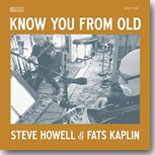 For
his latest release, Know You From Old
(Out of the Past Music), guitarist/singer
Steve Howell has replaced his usual band of
Mighty Men with one particular Mighty Man,
multi-instrumentalist Fats Kaplin, who
has worked with numerous artists such as Trisha
Yearwood, John Prine, Roy Book Binder, Nanci
Griffith, and The Tractors, to name a few. As
with previous Howell releases, the duo go way
back, exploring early American songs ranging
from blues, gospel, ballads, and early jazz and
deliver 13 tracks that pretty much define the
roots of American music. For
his latest release, Know You From Old
(Out of the Past Music), guitarist/singer
Steve Howell has replaced his usual band of
Mighty Men with one particular Mighty Man,
multi-instrumentalist Fats Kaplin, who
has worked with numerous artists such as Trisha
Yearwood, John Prine, Roy Book Binder, Nanci
Griffith, and The Tractors, to name a few. As
with previous Howell releases, the duo go way
back, exploring early American songs ranging
from blues, gospel, ballads, and early jazz and
deliver 13 tracks that pretty much define the
roots of American music.
The opener,
“Black Dog,” was first recorded in 1930 and
later recorded by Book Binder and Kaplin in the
mid '70s. Kaplin backs Howell on banjo on this
lively version. “San Francisco Bay Blues” was
recorded by Bay Area one-man-band Jesse Fuller
in the mid '60s and Howell and Kaplin (on
mandolin) give this tune a nice, warm feel.
“Buffalo
Skinners” is a traditional American western folk
song that tells the tale of a buffalo hunt in
1873. Howell takes a gentle approach to the
story and Kaplin's violin adds heft to the
story. The tale of “Bugger Burns” also dates
back to the 1800s, about a policeman in
Louisville who killed several men before being
killed himself. Howell and Kaplin's jaunty
version captures the barrelhouse feel of the
original song.
The uplifting
“Gospel Plow” is an African-American spiritual
dating back to 1917, taken from Luke 9:61-62,
and made popular by Mahalia Jackson. “The
Cuckoo” is a cool English folk song that dates
back to the 1200s, with Howell's guitar and
Kaplin's violin giving the song a haunting
backdrop.
“Blue Ridge
Mountain Blues” is an early country music tune
written by Riley Puckett of Gid Tanner and the
Skillet Lickers, and it's given a reverential
treatment from Howell and Kaplin, with a nod to
Puckett and Doc Watson, who later covered it.
The Scottish tune, “Cold Haily Windy Night,”
dates back to the 1700's, a “night visiting”
song. Howell effectively conveys the desire and
the ultimate sadness of the story. “The Escape
of Old John Webb” was made popular by Burl Ives,
who said it was part of a 20-verse from the
1700's about the jailbreak of a captured
counterfeiter.
Howell and Kaplin's gentle and somber version of
Blind Lemon Jefferson's “One Kind Favor” is
superb, with standout work from Howell on guitar
and Kaplin' on mandolin. “Shawneetown” describes
an early Ohio River settlement, and Howell and
Kaplin paint a vivid picture of life from a
couple of centuries back.
The final two
tracks venture into early jazz territory, with a
tender version of Ira Gershwin's “But Not For
Me,” and Duke Ellington's “Mood Indigo,” a
beautiful instrumental with Howell's guitar and
Kaplin's violin.
Steve Howell has
dug deeper than ever into the roots of American
music, with the able assistance of Fats Kaplin.
Know You From Old is another wonderful
set of classic music that will have listeners
going back to hear the older versions and
learning a bit about the beginnings of the music
that has helped shape their lives.
--- Graham Clarke
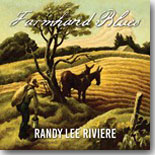 Randy
Lee Riviere teams up with Tom Hambridge once
again for Farmhand Blues (Wilderness
Records), a hard-driving 15-track set of blues,
rock, and roots recorded in Nashville with
musical support from producer Hambridge
(drums/percussion/backing vocals), Doug Lancio
(guitar), Bob Britt (guitar), Michael Saint-Leon
(guitar/harmonica), Mike Rojas (keys), and
Robert Kearns (bass). Riviere wrote or co-wrote
(with Hambridge) all 15 tracks. Randy
Lee Riviere teams up with Tom Hambridge once
again for Farmhand Blues (Wilderness
Records), a hard-driving 15-track set of blues,
rock, and roots recorded in Nashville with
musical support from producer Hambridge
(drums/percussion/backing vocals), Doug Lancio
(guitar), Bob Britt (guitar), Michael Saint-Leon
(guitar/harmonica), Mike Rojas (keys), and
Robert Kearns (bass). Riviere wrote or co-wrote
(with Hambridge) all 15 tracks.
“Downtown” opens
the disc, a powerhouse blues rocker, and the
gritty, down-and-dirty “Big On A Bender”
follows. The title track looks at the plight of
California farm workers, working long hours for
little pay. “Bird Watching” is a lighter,
country-flavored tune about, well, bird
watching, appropriate since Riviere is a
wildlife biologist by trade. “Alabama” leans
more to the rock side of the blues/rock aisle,
and “Linden Lane” has a more laid back '70s
southern rock feel.
“Moonlight” is a
blues/rock ballad about the one that got away,
and the moody “Cynical” has a paranoid feel with
the crunching guitar rhythms and Riviere's
snarling vocal. The intriguing “If I Were King”
is a change of pace, driven by piano at the
beginning, starting somewhat reserved but
picking up speed into a fiery slide guitar solo,
then settling back to the piano.
“Mother Lee”
opens with acoustic guitar, but plugs in pretty
quickly and slowly builds in intensity. On the
driving blues shuffle, “December 1980,” Riviere
looks at what happened in his life on the day
John Lennon was assassinated 45 years(!) ago. A
day most music fans probably recall as well.
“You Ain't No
Lovin' Woman” is a somber, subdued ballad about
a woman who's not sticking around, and “Pecos”
is a song about Riviere's horse, who's a lovable
handful. “On My Way Down” is a sturdy blues
rocker with a great guitar-driven rhythm, and
“Dovetail Joints,” the closer, is a moving
tribute to the working man.
Farmhand Blues
is a gripping album of original blues rockers
with outstanding guitars and great songs. Randy
Lee Riviere's weathered vocals are a perfect fit
for the material. Blues rockers who like a bit
of roots and country flavoring in their music
will be well satisfied with this album.
--- Graham Clarke
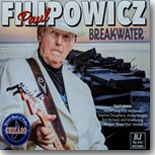 Chicago
guitarist Paul Filipowicz has been
toiling away on the Chicago blues scene for an
amazing 54 years, working with and around all of
the Windy City legends past and present.
Breakwater (Big Jake Records) is his newest
release, and it's packed with 12 tracks of
Chicago blues originals, covers, and tributes to
those who have passed. Chicago
guitarist Paul Filipowicz has been
toiling away on the Chicago blues scene for an
amazing 54 years, working with and around all of
the Windy City legends past and present.
Breakwater (Big Jake Records) is his newest
release, and it's packed with 12 tracks of
Chicago blues originals, covers, and tributes to
those who have passed.
Filipowicz sings
and plays guitar and harmonica, and is backed by
a hearty group of Chicago vets --- Martin Lang
(harmonica), E.G. McDaniel (bass), Jimmy Voegeli
(keys), Erik Beraud (saxes), and vocalist Maggie
“Blues Chic” Aliotta.
“Tuff Girl” is
the opening track, a rocking R&B track written
by Syretta Dobyans, with Filipowicz turning in a
robust vocal and screaming guitar work. Howlin'
Wolf's “I'm Leaving You” follows, and it's a
traditional Chicago blues boogie.
The title track
is a cool slow blues instrumental with fine
subtle guitar that speaks volumes, and “Sonny
Boy” pays tribute to Rice Miller, one of
Filipowicz's earliest influences. Lang's
harmonica and Voegeli's piano work give this
track a vintage feel.
“This Time I'm
Gone For Good,” one of Bobby “Blue” Bland's
biggest hits, is covered, with Filipowicz
delivering an appropriately soulful vocal and
tasty guitar, backed by Beraud's sax and
Voegeli's piano. Another instrumental, “Lefty
Phillips,” is a house-rocking tribute to two of
Chicago's unsung heroes of the post-war era –
Lefty Dizz and Brewer Phillips.
“Conversations
with Jr” begins with an outstanding three-minute
guitar intro before Filipowicz mixes in a couple
of verses from the Junior Wells song list as the
pace of the song picks up. “Ashes In The Wind”
is a Filipowicz original, a slow blues that that
has an enticing Hill Country drone in the guitar
riff and the solos sprinkled throughout.
The guitarist
pays tribute to yet another Windy City legend,
J.B. Hutto, with a raucous cover of “That's The
Truth” that the slide master would have
certainly approved. Maggie “Blues Chic” Aliotta
makes her recording debut with a nice cover of
“That's Why I'm Crying,” written by Magic Sam,
but her vocal closesly matches Koko Taylor's
version from the early '70s.
“Poor Boy” is a
funky blues with traditional blues themes that's
highlighted by Filipowicz's raw vocal and guitar
tone, and the album closer, “Rollcage,” is a
great instrumental in the Freddie King/King
Records tradition. Impressive guitar work on
this track and the rest of the album, for that
matter.
Breakwater
is a wonderful expression of the Chicago blues
sound, past and present, from beginning to end.
Blues fans are fortunate that there are talented
artists like Paul Filipowicz doing their part to
keep this sound alive and vital for fans old and
new.
--- Graham Clarke
 Mercedes
Nicole is a versatile vocalist whose
previous work has encapsulated blues, jazz,
soul, and gospel. Just in time for the holidays,
she's released Fire & Solitude, a
four-song EP of tunes that capture the Christmas
spirit in a big way. Mercedes
Nicole is a versatile vocalist whose
previous work has encapsulated blues, jazz,
soul, and gospel. Just in time for the holidays,
she's released Fire & Solitude, a
four-song EP of tunes that capture the Christmas
spirit in a big way.
Ms. Nicole
composed two of the tracks, the sultry
jazz-flavored opener “Close” and the
slow-burning blues closer “Read My Christmas
List.” In between the two originals are two
Christmas favorites, “Merry Christmas Baby” and
“Please Come Home For Christmas.”
Ms. Nicole's two
originals are top notch, and her interpretations
of the two classics is also first rate as she
nimbly moves from blues to jazz to soul on these
four numbers. She gets outstanding support from
Abel Boquerra, Jake Sele, and Delvon LaMarr
(B3), Andrew Coutier, Brian Kirk, and Mark
Ivester (drums), Scotty Harris, Evan Flory
Barnes, and Wayne Bliss (bass), Rod Cook,
Thaddeus Turner, and Rafael Tranquilino
(guitar), and Max Rose, Alexey Nickolave, and
Irv Kellenberger (tenor sax).
Fire &
Solitude is a great disc to put on at the
end of a hard day of shopping, wrapping gifts,
cooking Christmas dinner, or just chilling out
by the fire. Mercedes Nicole has a voice that
you can get lost in pretty easily.
--- Graham Clarke
And now for a
quick look at a whole bunch of singles that have
been released .......
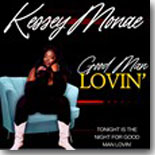 Kessey
Monae's “Good Man Lovin'” (PKMG LLC) finds
the young vocalist weary of the various
two-timers and mistreaters that have crossed her
path, so she decides to find a good lover who
will treat her right. This is a nice soul blues
track that is reminiscent of some of the '80s
and '90s tracks that made the rounds on Malaco
with a lot of success, so hopefully Ms. Monae
will experience some of that success with this
fine effort. Kessey
Monae's “Good Man Lovin'” (PKMG LLC) finds
the young vocalist weary of the various
two-timers and mistreaters that have crossed her
path, so she decides to find a good lover who
will treat her right. This is a nice soul blues
track that is reminiscent of some of the '80s
and '90s tracks that made the rounds on Malaco
with a lot of success, so hopefully Ms. Monae
will experience some of that success with this
fine effort.
Harrell “Young
Rell” Davenport has issued another single,
“Fatherless Child” (Rell Tone Records).
Davenport wrote the song and plays guitar,
harmonica, and tambourine with percussion
support from Kenny Smith. Young Rell sings of
the pain and uncertainty of growing up without a
father. It's a highly personal track as
evidenced by his sincere and emotional vocal
delivery. Davenport is rapidly developing into
one of the most intriguing and exciting young
voices on the current blues scene, and his
dedication to the music shines through on every
note played and sung.
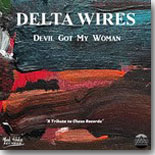 The
latest single from Delta Wires continues
their tribute to Chess Records' 75th
Anniversary. It's a fiery electric version of
Skip James' “Devil Got My Woman,” recorded
by the band without their horn section (for the
first time ever). The remaining five members
(Ernie Pinata – vocal/harmonica, Richard Healy –
guitar, Tom Gerrits – bass, Anthony Malfatti –
piano, Tony Huszar – drums) are able to
recapture the style of the earlier Chess
recordings, with Pinata laying down a scorching
harmonica solo. Their version of the classic
James' tune really puts the song in a new
perspective that's highly effective. The
latest single from Delta Wires continues
their tribute to Chess Records' 75th
Anniversary. It's a fiery electric version of
Skip James' “Devil Got My Woman,” recorded
by the band without their horn section (for the
first time ever). The remaining five members
(Ernie Pinata – vocal/harmonica, Richard Healy –
guitar, Tom Gerrits – bass, Anthony Malfatti –
piano, Tony Huszar – drums) are able to
recapture the style of the earlier Chess
recordings, with Pinata laying down a scorching
harmonica solo. Their version of the classic
James' tune really puts the song in a new
perspective that's highly effective.
Stevie J Blues
updates the 1998 J Blackfoot tune “Your Mouth
Wrote A Check” (PKMG LLC), upping the funk ante
and picking up the pace a bit. His vocals and
guitar work is spot on, as always, and he brings
the song to 2025 with a fresh new approach that
should bring together fans of the older version
and those who pick it up in this new version.
This is another fine effort from the Jackson,
Mississippi blues man.
--- Graham Clarke
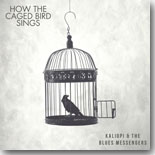 A
very intriguing single from Australian group
Kaliopi & The Blues Messengers showcases the
voice and guitar playing from this woman who has
Greek heritage before winding up down under. She
does a beautiful tribute to Maya Angelou on "How
The Caged Bird Sings." A
very intriguing single from Australian group
Kaliopi & The Blues Messengers showcases the
voice and guitar playing from this woman who has
Greek heritage before winding up down under. She
does a beautiful tribute to Maya Angelou on "How
The Caged Bird Sings."
Sugaray Rayford, the Arizona singer with a
big, big voice has a new album on the way, with
the funky mid-tempo blues shuffle "How The Other
Half Lives" giving us a preview of what to
expect.
 One
of my favorite singers from the past few years
is Teresa James and her band The
Rhythm Tramps. "Show Biz" is an
autobiographical thing that could apply to any
musician starting out in a very tough business.
As with any single being released, I sincerely
hope that it's an indicator to an upcoming new
album. One
of my favorite singers from the past few years
is Teresa James and her band The
Rhythm Tramps. "Show Biz" is an
autobiographical thing that could apply to any
musician starting out in a very tough business.
As with any single being released, I sincerely
hope that it's an indicator to an upcoming new
album.
To go with his live album, Live at
SPACE, released on Delmark this
past summer, guitarist Dave Specter has
given us another version of one of his often
played instrumentals, this time calling it "New
west Side Stroll."
I've
been a big supporter of Canadian soul/blues
singer Ndidi O ever since discovering her
wonderful album from last year, Simple Songs
For Complicated Times. Her new single is
more of the same as she sings about the issues
women face as they age on "Old Crone." If you
aren't yet familiar with this marvelous singer,
then I highly recommend you find the album I
just mentioned and then download this new
single.
--- Bill Mitchell
|